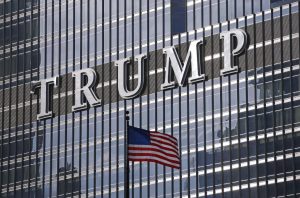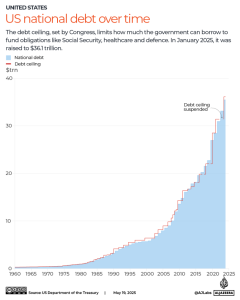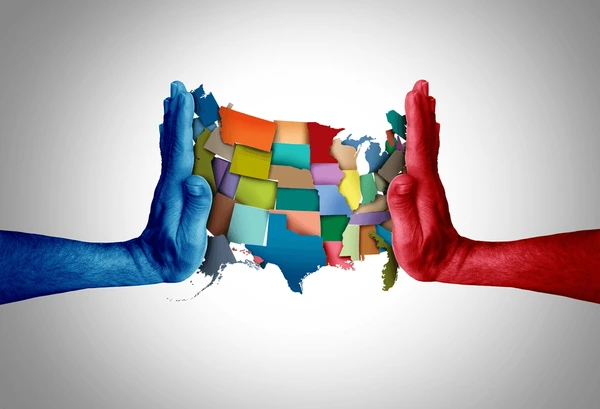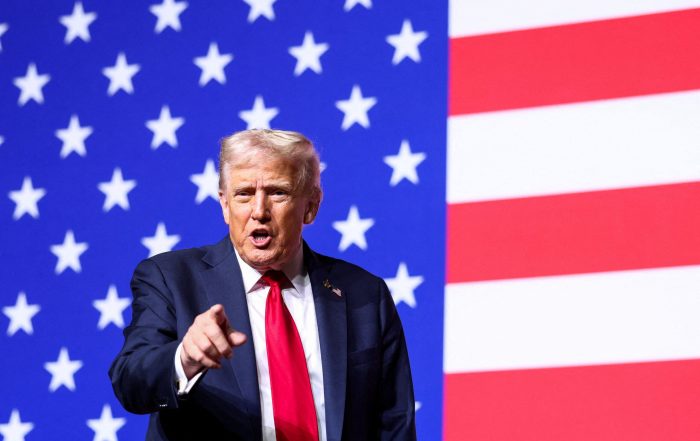The Business of Government
Here is a question. Should a government be run like a business? Some might say “yes”, and some “no”. Trump is running the US Government like a business. He is cutting staff, negotiating, or trying to negotiate deals and using tariffs as a source of revenue.
Unfortunately, he is running the US Government as a business. The problem is that he runs it as a profit-making source for his personal businesses.
Let me give some examples. In the crypto world, since he is the person creating rules about crypto, he started his own cryptocurrency. The issue of conflict of interest does not seem to concern him. He can profit in a market where he makes the rules. Imagine a government consulting firm that was also responsible for hiring consultants to the government, or a minister for mines who invested in new mines. Oh, sorry. We had one of those. Eddy Obeid.
Trump also decides who stays in prison because he can issue pardons. In the whole tawdry Geoffrey Epstein case, can we ever trust anything Giselle Maxwell says since Trump can grant her a pardon if he wants? He will not want to if she exposes any of Trump’s dirty laundry.
 He has made it known that visiting dignitaries should stay at his hotels. Some countries have booked far more rooms than required to get a few bonus points with Trump. House Oversight minority staff reported at least $7.8 million in payments from 20 foreign governments to Trump businesses while he was president (notably China, Saudi Arabia, Qatar, UAE). This was cited as violating the Constitution’s Foreign Emoluments Clause.
He has made it known that visiting dignitaries should stay at his hotels. Some countries have booked far more rooms than required to get a few bonus points with Trump. House Oversight minority staff reported at least $7.8 million in payments from 20 foreign governments to Trump businesses while he was president (notably China, Saudi Arabia, Qatar, UAE). This was cited as violating the Constitution’s Foreign Emoluments Clause.
He now has a majority in the Supreme Court. The court dismissed multiple lawsuits against Trump after his first term. It is all good business.
It is not just foreign governments. The U.S. Secret Service and other agencies paid the Trump Organisation for lodging and services during presidential travel (e.g., Mar-a-Lago, Bedminster, Trump International Hotel DC). Public records show hundreds of thousands to over $1 million in such payments. Good business again.
It is not just providing a few rooms. The US Government hosts conferences. Hosting major summits at Trump venues (even if “at cost”) raises self-dealing concerns because it steers prestige, attention, and potential revenue to his business. For example, the 2019 plan to host the G-7 at Trump Doral was reversed after bipartisan backlash over conflicts; in September 2025, he announced plans to host the 2026 G-20 at Trump Doral, rekindling those concerns.
Having such a powerful position means that other countries offer services that, in different situations, might be considered bribes. China granted dozens of “Trump” trademarks (applications pre-dated the presidency, but approvals came after the election), prompting concerns that favourable IP decisions by foreign governments could constitute things “of value” to the president.
Even at home, Mar-a-Lago membership fees doubled to $200,000 shortly after the 2016 election, illustrating how public office can elevate the commercial value of a sitting president’s private venue.
So, personally, Trump is benefiting enormously from his time at the White House. Other Presidents have all disassociated themselves from their financial activities during their time in office. Trump has ramped up his activities.
Trump is obviously using government to further his own private businesses, but how is he doing in running the US Government as a business for the people?
A basic rule of business is that if it doesn’t make a profit, get out of the business. A basic rule of democratic government is to provide services that the private sector cannot or will not deliver. Public transport at less than cost. Medicines with subsidies. Health care for everyone, not just those who can afford it. Welfare for those needing it. Infrastructure that would fail a commercial business case.
In some cases, Trump wants to turn the government into a business. If he can make it happen, he wants a service to only be there if you can pay for it. The concept of redistribution of taxation is alien to a businessman. If the government is running up a debt, cut the expenditure. Don’t increase taxes; in fact, cut taxes.
Yet on one point, he is right. Governments cannot run up debts forever. In 2024, the repayment of net interest was $870 billion. Remember that number. It has nothing to do with reducing the debt, which is currently $37 trillion. It is to repay the annual interest.
 To put the $877 billion into perspective, the current Defence budget is $822 billion. It is estimated that on the current track, by 2055, the most oversized line item in the US budget will be repayment of interest on borrowings. Bigger than defence; bigger than social security; bigger than medical.
To put the $877 billion into perspective, the current Defence budget is $822 billion. It is estimated that on the current track, by 2055, the most oversized line item in the US budget will be repayment of interest on borrowings. Bigger than defence; bigger than social security; bigger than medical.
We might ask how a business would reduce interest payments. They would either increase revenue or decrease costs – probably a mix of both. In government terms, it means increasing the tax collected or reducing the services provided. Trump has no intention of increasing the rate of taxation, although he will collect more taxes through his tariffs. Will it make a dent in the $877 billion payment each year?
Treasury Secretary Scott Bessent reported that the U.S. has already collected about $100 billion in tariff revenue during 2025 so far and projects it could reach $300 billion by the end of the calendar year. That is just over a third of what interest costs. It does nothing towards reducing the debt.
Tariff figures are tossed about by various authorities, ranging from $2.3 to $3.3 trillion over ten years. Given the uncertainty of tariff rates, and the uncertainty of whether future governments will abandon them, the figures are at best rubbery. There is also the TACO factor.
$2.3 to $3.3 trillion is around $230 to $330 billion per year. Remember, the interest bill is $877 billion a year. We are nowhere near paying down the debt, given that government revenue is shrinking.
Why is it shrinking? Aside from tax cuts for the rich, tariffs mean higher prices, which means people cannot afford to buy as much. More expensive imports of both machinery and raw materials push up the prices of US-manufactured goods, making them less competitive internationally, which in turn leads to a decline in exports.
If it were a business, you would have to increase income, which in government terms means even more taxes, not less. While tariffs are increasing taxation income, Trump’s reduced taxes for the rich, reduced consumption through higher prices, and less competitive exports are all reducing tax collection.
So, to answer the original question, running a government like a business on a personal level is, at best, unethical and at worst, corrupt. Running it like a business on a whole-of-government level has some merit in terms of balancing the books, but it requires brave decisions.
If you are to match income (taxation) with service provided (outgoings), you must be prepared to control both. It appears that when it comes to running government as a business, the US only runs Government as a personal business.






